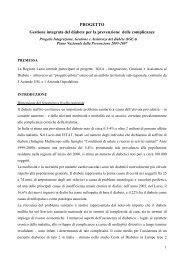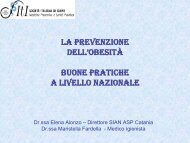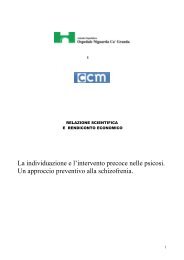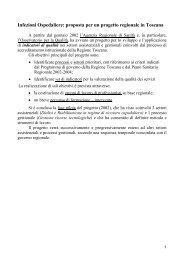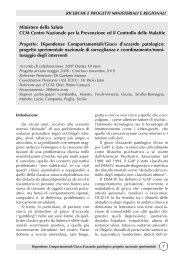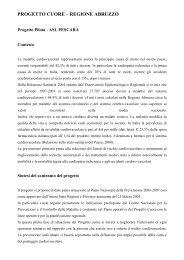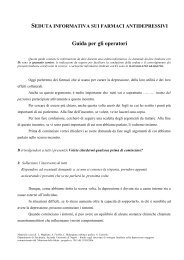Gaining health : analysis of policy development in European ...
Gaining health : analysis of policy development in European ...
Gaining health : analysis of policy development in European ...
You also want an ePaper? Increase the reach of your titles
YUMPU automatically turns print PDFs into web optimized ePapers that Google loves.
Chapter 4<br />
160<br />
The strategy is seen as a further ref<strong>in</strong>ement <strong>of</strong> proposals<br />
for cancer control set out <strong>in</strong> the Health Strategy and was<br />
developed <strong>in</strong> accordance with recommendation 12 <strong>of</strong> that<br />
Strategy. Although it is stated that more than 30% <strong>of</strong> all<br />
cancers are preventable, and that prevention must rema<strong>in</strong> a<br />
central focus <strong>of</strong> cancer <strong>policy</strong>, the aims set out <strong>in</strong> the <strong>in</strong>troduction<br />
relate almost exclusively to <strong>health</strong> care. One <strong>of</strong> the<br />
central proposals is for the reorganization <strong>of</strong> <strong>health</strong> services<br />
around four cancer control networks, each serv<strong>in</strong>g about<br />
one million people and with about eight cancer centres<br />
each serv<strong>in</strong>g a m<strong>in</strong>imum <strong>of</strong> 500 000 people.<br />
This <strong>health</strong> care focus appears to be <strong>in</strong> tune with prevail<strong>in</strong>g<br />
public sentiment. An evaluation <strong>of</strong> the 1996 National Cancer<br />
Strategy, <strong>in</strong>clud<strong>in</strong>g a broadly based consultation process,<br />
found that the target to reduce mortality from cancer <strong>in</strong><br />
the under-65 age group by 15% <strong>in</strong> the ten-year period from<br />
1994 had been reached by 2001. Those consulted commonly<br />
stated the ma<strong>in</strong> achievement <strong>of</strong> the 1996 strategy as<br />
be<strong>in</strong>g that <strong>of</strong> provid<strong>in</strong>g a framework for the <strong>development</strong><br />
and fund<strong>in</strong>g <strong>of</strong> cancer services. The relatively poor survival<br />
rates for common cancers <strong>in</strong> Ireland, together with the<br />
expected <strong>in</strong>crease <strong>in</strong> the <strong>in</strong>cidence <strong>of</strong> cancer due to population<br />
age<strong>in</strong>g, led the 2006 strategy to conclude that there<br />
“needs to be significant expansion <strong>in</strong> all aspects <strong>of</strong> cancer<br />
service capacity”. As part <strong>of</strong> this effort, screen<strong>in</strong>g for breast<br />
and cervical cancer has been expanded and funds made<br />
available to <strong>of</strong>fer this programme by 2007. Approval has<br />
also been given for a national network for radiation oncology<br />
services to be put <strong>in</strong> place between 2008 and 2011 (4).<br />
The strategy refers to the national <strong>health</strong> promotion <strong>policy</strong><br />
and to policies relat<strong>in</strong>g to risk factors such as smok<strong>in</strong>g,<br />
alcohol abuse, nutrition and physical activity, endors<strong>in</strong>g their<br />
full implementation. Specific recommendations are made to<br />
deal with the danger from ultraviolet radiation and radon,<br />
and for population-based screen<strong>in</strong>g where there is evidence<br />
that this is effective.<br />
Proposals are made for better monitor<strong>in</strong>g <strong>of</strong> <strong>in</strong>equalities <strong>in</strong><br />
cancer risks, occurrence, uptake and access to services, and<br />
<strong>of</strong> outcomes <strong>of</strong> care. The need for further human resources<br />
plann<strong>in</strong>g and research is also covered.<br />
2.5 Policies related to risk factors<br />
2.5.1. Towards a tobacco-free society<br />
Ireland is now one <strong>of</strong> the lead<strong>in</strong>g countries <strong>in</strong> tobacco<br />
control. Broad consensus on the need for this has been<br />
achieved through susta<strong>in</strong>ed effort and the fortuitous appearance<br />
<strong>of</strong> a strongly anti-smok<strong>in</strong>g M<strong>in</strong>ister committed to<br />
see<strong>in</strong>g the battle through.<br />
The change <strong>in</strong> public attitudes to smok<strong>in</strong>g built up slowly.<br />
Towards the end <strong>of</strong> 1999, the Parliamentary Jo<strong>in</strong>t Committee<br />
on Health and Children published a report on <strong>health</strong><br />
and smok<strong>in</strong>g, recommend<strong>in</strong>g that a national anti-tobacco<br />
strategy be adopted. A Tobacco Free Policy Review Group<br />
was set up to carry out a review <strong>of</strong> <strong>health</strong> and tobacco<br />
and make appropriate recommendations. The report <strong>of</strong><br />
the Review Group, Towards a tobacco free society (28), was<br />
published <strong>in</strong> 2000 and adopted as government <strong>policy</strong>. The<br />
strategic objectives are:<br />
• to change attitudes<br />
• to help people give up smok<strong>in</strong>g<br />
• to protect people from passive smok<strong>in</strong>g<br />
• to focus on children.<br />
One recommendation was the sett<strong>in</strong>g up <strong>of</strong> an <strong>in</strong>dependent<br />
statutory body, the Office <strong>of</strong> Tobacco Control (OTC),<br />
formally established <strong>in</strong> 2002 through the Public Health<br />
(Tobacco) Act. The OTC was responsible for national<br />
implementation <strong>of</strong> the smoke-free law.<br />
The means <strong>of</strong> implement<strong>in</strong>g the strategy are far-reach<strong>in</strong>g,<br />
<strong>in</strong>clud<strong>in</strong>g ga<strong>in</strong><strong>in</strong>g support from key figures and local communities,<br />
provid<strong>in</strong>g adequate <strong>in</strong>formation and support<br />
for research <strong>in</strong> collaboration with the ma<strong>in</strong> NGO (ASH<br />
Case studies: <strong>policy</strong> <strong>development</strong> <strong>in</strong> countries for tackl<strong>in</strong>g noncommunicable diseases




